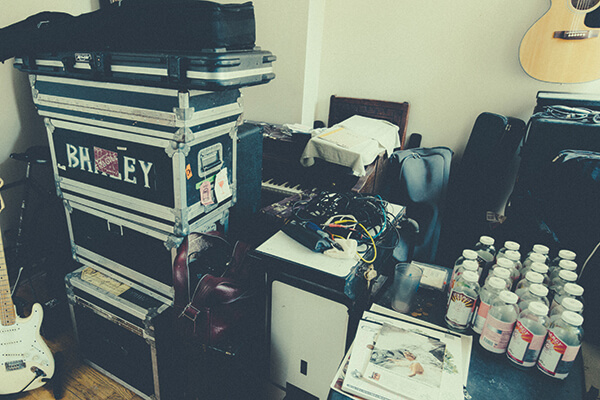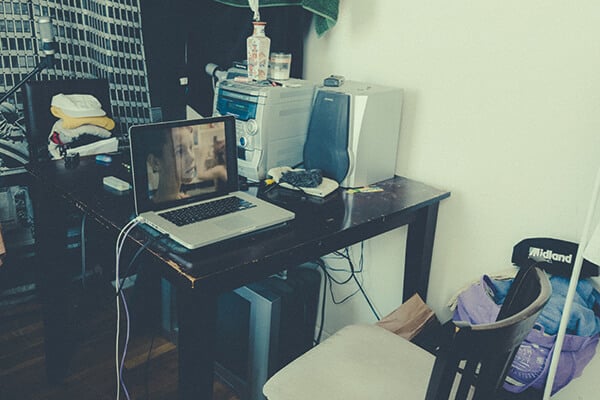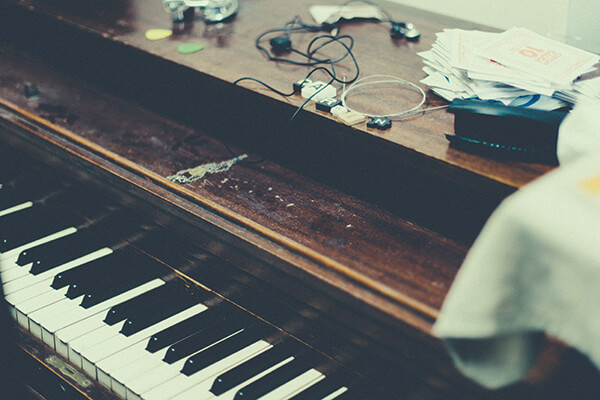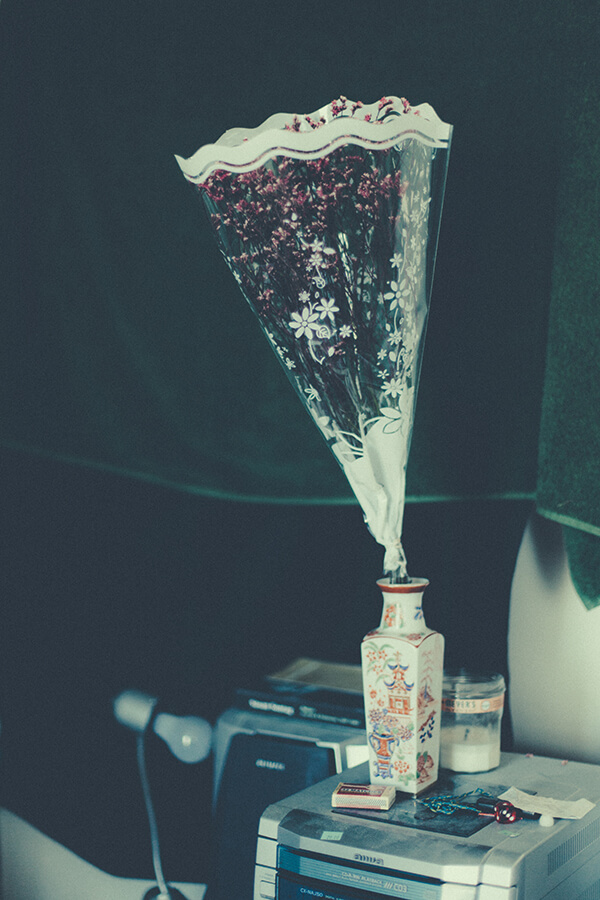My first home studio consisted of a tower PC running a MIDI sequencer, a Korg DW-8000 synthesizer, and an Akai S-2000 rack mount sampler. I made drum ’n bass with that setup in my teens. I used to download breakbeats off the Internet using the family computer, cut them up in Cool Edit, and transfered them via floppy disk to the sampler. I saved my allowance for months to buy that sampler. It could do anything the beloved MPC-2000 could do, but it looked like a VCR rather than a spaceship’s control console. I got the S-2000 to save money, and saving money is high on the list of reasons to record at home.

These days, the price of studio time is always relative to the price of a new laptop in my mind. And these days, a laptop running Logic comprises the sampler, the synth, the sequencer, the four-track, and a boatload of effects and digital sound processing. So there’s another reason to record at home: the tools for composition come in the same box as the recording gear. Now let’s say you’re a strong-headed Aries who likes to be in charge and not have to compromise with anyone else. You’ve just accessed the third reason to record from home: complete autonomy. Oh yes, and no hourly rate to worry about. Infinite time. I spent two-and-a-half years writing and recording my debut album at home in my Lower East Side apartment. That’s kind of a long time.
My heroes at the time were Animal Collective and Ariel Pink, lo-fi DIY masters whose homemade sounds created an emotional intimacy in the music. I’m talking about the debut albums of both artists. That first Animal Collective album is mixed with so much treble, you can almost hear their hearing damage. But the compositions and the performances are so full of magic and integrity that the lack of audio fidelity just adds to the story and to the uniqueness. The lo-fi quality makes it sound authentic. I personally try (within reason) to capture sounds with fidelity. But I always know that any failing in that area only serves to increase the authenticity of the artifact, to the right ears. There’s a lot to be said for Quincy Jones’ amazing productions, but there’s also something magical about Michael’s home demos. That’s another great thing about home studios: the opportunity to learn by doing. I dropped out of college after my sophomore year for two main reasons: a) you don’t need a degree to be a musician, and 2) the way I learn things is by diving into them headfirst.

One of my favorite experiences as an autodidact was the ear training I did right around the time I quit school. I sat with my guitar and honed my ability to identify each chord’s harmonic function within a song. With a simple guess-and-check method, I began to collect and recognize the sound of IV chords, as opposed to the sound of V chords. It was hugely satisfying to listen to Fine Young Cannibals “She Drives Me Crazy,” and be able to correctly guess that the chorus progression is I-IV-vi-V. To this day I use my hard-won familiarity with chord sounds to diversify my compositions on each album and ensure that I am not accidentally traversing the same harmonic pathways over and over because I-IV-V in C sounds the same as I-IV-V in F. I couldn’t tell you what key the FYC song is in. I don’t think it’s relevant! Right, so how is all this chord stuff relevant to recording at home, then?
There is so much to learn about engineering, mixing, mastering, etc. There is always more to learn. And there is always more music making to do. And life is not just about one or the other—just learning or just doing. Just learning—that’s like a technician who reads every manual, but never even turns the power on. Just doing—that’s like a carpenter hammering away, oblivious to blueprints and how to read them. My favorite approach is to learn while doing, and it’s the most intrinsically rewarding part of recording at home.

At a professional studio, it’s polite to let the engineers handle the engineering. You might walk away with a nice recording, but you won’t learn anything about engineering if you’re being professional in there. I make records at home and maybe they’re good and maybe they’re liked by some people. But even if they aren’t liked by anyone, I still gain experience and knowledge along the way. And that makes it easier to devote myself to such an unpredictable career path. It makes it easier to accept my life. It gives me skills for when my 15 minutes are over.
So what if I’m preaching to the converted? In that case you just wanna know what gear I use. So I’ll tell you. For my debut record released in 2010, rhythm guitars were played through a Crate G10 practice amp, eBay value about $20. Vocals, guitars and percussion were miked with an AT-3035, which I bought used for about $200. The preamp for everything was a Behringer Eurorack 802 mixer. I tracked the record on an old tower PC, pictured in the liner notes, using Acid 4.0. Mix bus processing involved a lot of Waves L-series Limiters. On my second album, I used a Shure SM-7B, “the Michael Jackson mic,” for all the lead vocals. The preamp for everything on album number two was an Apogee Duet 2. I tracked everything that wasn’t sampled at home in Logic and sent the songs off to be mixed professionally (also in Logic/Pro Tools). This record featured a mix of my Hiwatt Custom 50 amp miked with an AT-4047 condenser mic and amp simulators from the AdrenaLinn III.

On my new album I’ve used the AT-4047 for all but two of the lead vocal tracks, again using the Duet 2 for the preamp. For the other two lead vocals I used the holy grail of vocal mics, a U47, during one day at a real studio. The AT-4047 cost me about $600. The U47s cost around $10,000. Maybe check out my new record and see if you can guess which songs feature the fancy mic. It’s surprisingly hard to tell! I always would have wondered about that U47 though. I’m glad I got to try it out.
ABOUT THE AUTHOR
Darwin Deez is a New York-based independent musician. His third album Double Down is due out this September on Lucky Number Records. Follow him on Twitter @darwindeez.
